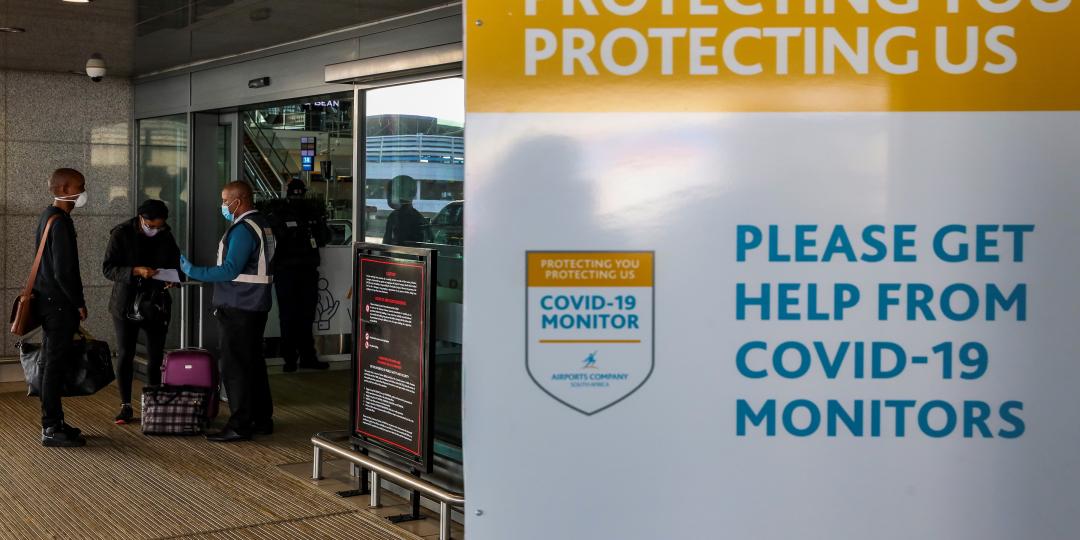Authorities have moved to reassure business travellers that Cape Town International Airport (CTIA) is safe after Western Cape airports were listed as high risk for COVID-19 transmission by the European Union Aviation Safety Agency (EASA). The Western Cape has the most recorded COVID-19 cases in South Africa, mostly concentrated in Cape Town.
After visiting CTIA last week to assess its bio-security measures, Western Cape Finance and Economic Opportunities MEC, David Maynier, and Cape Town’s Mayoral Committee Member for Economic Opportunities and Asset Management, James Vos, said they were impressed with the airport’s readiness, and confidently declared it was ready to welcome visitors.
Enhanced cleaning and disinfection are advised at EASA-flagged airports to protect passengers and crew. No other airports in South Africa are on the list, which, however, includes airports in 36 countries, including high-profile ones such as Heathrow, Gatwick, Schiphol, Madrid, Stockholm, São Paulo, Rio de Janeiro and Singapore. Egypt is the only other African country listed.
EASA says the list was compiled from data obtained from the World Health Organization and the European Centre for Disease Prevention and Control. Listings are based, among other criteria, on the number of active COVID cases in a region, the number of recoveries, tests, deaths, transmission trends and size of airports serving the area.
CTIA GM, Deon Cloete, says EASA didn’t consult CTIA before compiling the list. However, he confirms that the airport is safe for use and can support the industry in building passenger confidence.
After a slow start last week, CTIA is expected to see 90 aircraft movements a day this week as FlySafair and Mango join Airlink in starting scheduled domestic services on the Golden Triangle between Cape Town, Johannesburg and Durban. Flights will operate from 06h00 to 18h00. (Aircraft movements also include cargo flights, repatriation charters and general aviation.)
Cloete says new bio-security protocols will result in longer processing time of flights: up to 45 minutes for domestic flights, while flight turnarounds will take 30 minutes longer, lasting up to 60 minutes. He says new requirements of 1.5m social distancing will reduce the capacity of CTIA’s domestic arrivals terminal from 1 800 passengers per hour to 1 100 passengers per hour.

All procedures will be fine-tuned as lessons are learned and new technology becomes available, he adds. Future innovations being considered include sniffer dogs that can detect asymptomatic COVID carriers; and ‘smart helmets’ equipped with thermal cameras to detect people’s body temperatures.
Valuable experience
Cloete says CTIA gained valuable experience when assisting with the repatriation of nearly 8 000 passengers to destinations worldwide since the lockdown began in March. Acsa also began preparing for the reopening of scheduled domestic services six weeks ago and developed new bio-security airport procedures based on the international roadmap for restarting aviation developed by Iata, Icao and Airport Council International.
The procedures were shared with Lanseria International Airport, the Airlines Association of Southern Africa, the Board of Airline Representatives of SA and the Civil Aviation Authority. He says the CAA approved CTIA’s updated operating procedures and will audit them to ensure the airport meets all requirements.
Cloete adds that the bio-security measures are to ensure the highest level of safety precautions for passengers. “As soon as a flight has been checked in, sanitisation teams move in and clean everything. The same happens at security,” he explains. To boost passenger confidence, CTIA has appointed clearly identifiable COVID-19 monitors to ensure everyone adheres to the protocols.
These include:
- Only passengers wearing masks and presenting travel permits are allowed into the airport building;
- On entering, passengers are screened by Port Health officials;
- Passengers must adhere to social distancing markers;
- They are encouraged to check in online at home, but self-check-in kiosks are available;
- Perspex screens have been fitted at check-in counters and only alternate counters are being used;
- Luggage trolleys are sanitised regularly;
- Checked baggage is sanitised;
- Passengers must scan their own boarding passes;
- All loose items must be placed in hand luggage (only laptops will be allowed in trays);
- Passengers setting off metal detectors will be asked to remove belts and shoes (no more patting-down);
- Retail outlets will open gradually on a limited basis;
- MyCity buses are not operating to the airport yet, but people can use taxis and car rental;
- Parking is only available in Parkade 2, which is also the new location for pick-up and e-hailing.
























